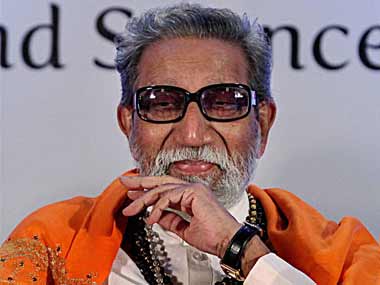The task of the policemen deployed around the Kalanagar area, where Bal Thackeray’s residence is, is by no means easy. With him within, battling to live, and the throngs of the party cadre outside anxiously praying, it is tough indeed. They have to be on their toes, they have to be careful, and they have to deal with a restive crowd of Shiv Sainiks. The deployed personnel cannot be careless as they normally would be and create an incident which can trigger confusion and anger. They literally have to walk – or in this case, stand – on eggs, careful that they do not break any. If they didn’t, it would be as bad as inaction, should an action be warranted. They need to be not only be fit but be in fine mental fettle. [caption id=“attachment_526813” align=“alignleft” width=“380”]  Bal Thackeray. PTI[/caption] One does not know how long this restraint by the followers of Thackeray can remain. Their restlessness was expressed in the slogan, ‘Balasaheb, darshan dya’ —translated, ‘Balasaheb, appear before us’, or ‘allow us to see you’. This could possibly be because of the near-free access to other politicians and incessant flow celebrities to enter Matoshree. To say the least, the situation is rather delicate and can diffuse only when Bal Thackeray is announced to be entirely well and back on his feet. The policemen deployed there have to ensure that things do not slip out of hand in their 24x7 vigil. We don’t even know if they are being rotated in shifts to keep them composed and alert but long, unbroken spells on assignment is rather the norm. And yet, the very men who should contain any situation are in a bad spot themselves. The Indian Express reported today how the personnel have been left to fend for themselves on a crucial count: drinking water and food. They are dependent on a restaurant in close proximity in the Bandra suburb for the stuff without which even the best of policemen can become listless. Initially, they sought out the place for drinking water. Then, in the two days since they were posted there, and without supply of food, they found that the generosity of the restaurateur was far stronger than the logistics of the police department. It is as if the cops can survive on thin air and nothing else besides. At least, that is the best construct possible. That this kindly restaurateur is able to feed as many as 4,000 of them free each day is in itself a wonder. It calls for a remarkable marshalling of resources and manpower as well. It is as if a single determined Shiv Sena believer, Sharad Shelar, can outdo the police, who, we assume, are organised. Communities have to respect the policeman, but the police personnel have to be independent of the community. It is common knowledge that police force is always stretched in the duties it has to perform and often blamed for poor performance. It is forgotten that a constable on duty, any duty, has to be as if going to war: weapons, subsistence material, communications et al, without which he can be a failure. It ought to have occurred to the top brass that they are rendering their manpower weaker by this neglect of the basics. It ought to have struck them that tomorrow, the same generous man, should he decide, can compromise the police system by calling for encashment of the brownie points earned now with the policemen. It is forgotten that there are no free lunches. Just behind the Thackeray residence, on the road leading towards Sahitya Sahwas, where Sachin Tendulkar was raised, and then on to Patrakar, where journalists lived, is a long tin shack which occupies the entire sidewalk within which are barracked the policemen who are on general security duty to look after Bal and Uddhav Thackeray’s safety. It is akin to living in a slum right next to the high profile VIPs, mostly a metaphor for Mumbai. That brutalises the personnel to such an extent that to expect even civic conduct from them would be an outlandish idea. Look at the television footage of how the men in khaki have behaved in any explosive situation: in Kolhapur, where farmers are agitating for better sugarcane prices, a lathi charge was not to disperse the mob but punish them. One clip showed a man felled to the ground being repeatedly beaten so outrageously that a court should take suo motu cognizance of the police brutality which we have come to accept as how normal policing is carried out in India. Any number of examples can be cited from incidents across the country because police conduct is much the same everywhere. It is the Indian Police Code, as it were. If the managers of the force are insensitive, one cannot expect the force’s personnel to be sensitive. It makes for common sense. The Army, the BSF, the CRPF, and such para-military forces have a system in place: establish a camp, provide the necessities even as the manpower is deployed. Then the best – or worst – demands are made of the men.
The police on duty, their drinking water and food, and consequences thereof.
Advertisement
End of Article
Written by Mahesh Vijapurkar
Mahesh Vijapurkar likes to take a worm’s eye-view of issues – that is, from the common man’s perspective. He was a journalist with The Indian Express and then The Hindu and now potters around with human development and urban issues. see more


)
)
)
)
)
)
)
)
)



